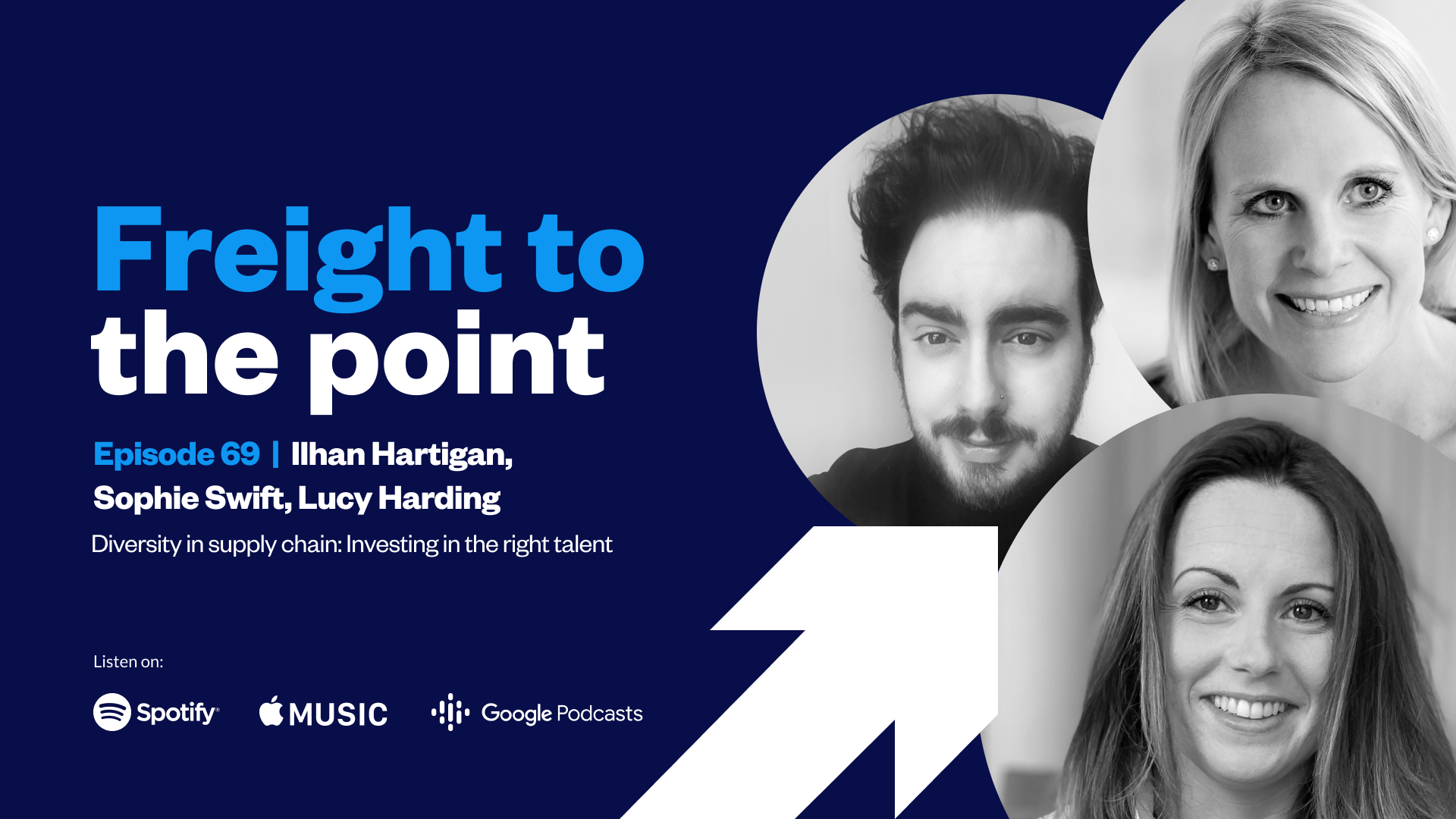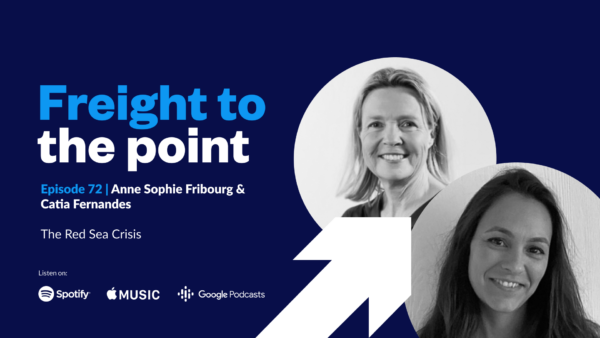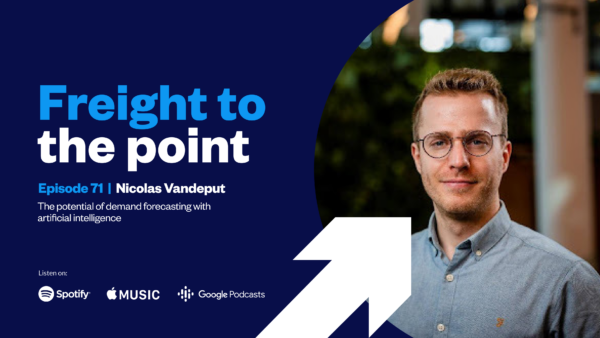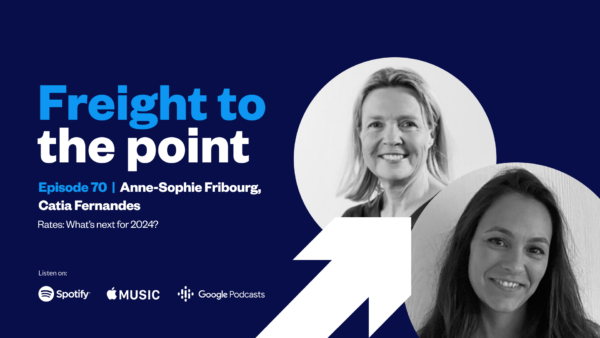Episode 69:
The Power of Diversity in the Supply Chain:
Opportunities and Challenges
See all episodes

To make the right changes in an organisation, it’s crucial to attract the right talent, and diversity plays a significant role in achieving this.
Diverse teams bring together people with different backgrounds, experiences, and perspectives, which leads to innovation, creativity, and better decision-making.
Tune into the latest Freight to the Point episode as we’ve featured a Navigate session with Ilhan Hartigan, People Director at Zencargo, Sophie Swift, Head of Delivery at MATCHES and Lucy Harding, Partner and Global Head of Practice, Procurement and Supply Chain at Odgers Berndtson to discuss the opportunities and challenges of diversity in the supply chain industry.
Resources
Episode 68: How can we inspire the next generation of supply chain leaders?
What will it take to bridge the supply chain talent gap?
Ilhan Hartigan:
Hello, audience of Navigate. Hope you’ve enjoyed today’s session. Hello to my fellow Zenonites. I’m Ilhan. I’m the director of People here at Zencargo. I myself sit on our own DE&I committee, which has been a great journey, seeing different points of views about things that could be changing inside and outside of the industry. There’s certainly a lot to do in terms of diversity, equity, and inclusion from an industry and employees perspective.
Today, we’re going to have a conversation. Give you some insights of some of the discussions that we have around this topic. I think we all know that the supply chain is already tackling a talent shortage. And in order to attract new talent, organisations need to devise and also commit to DE&I actions, especially as we move through an ever evolving socioeconomic landscape.
This includes us here at Zencargo. We’ve been on a great exploratory journey inside and outside of our own industry. And this panel today will give you insights to some of those conversations that we have. I’ve invited Lucy Harding from Odgers Berndtson and Sophie Swift from MATCHES to participate in the panel today. How it’s evolved over time when we talk about diversity and supply chain and why the industry needs to continue to rally behind change initiatives.
So, hello, Sophie. Hello, Lucy. Thank you both for joining me in the conversation today. Lucy, I’m going to hand over to you for an introduction, and then, Sophie, we’ll move to you. Just a brief intro on your company role and background today.
Lucy Harding:
Thank you, Ilhan. Thanks for having me. So, I work for a firm called Odgers Berndtson. We are the global executive search business. We work with clients across all industries and geographies and all sorts of different senior leadership roles. My focus is to recruit chief supply chain and chief procurement officers and their leadership teams. I’ve been here for 12 years now in the industry, in and around procurement supply chain since I graduated in 1998. Over to Sophie.
Sophie Swift:
Hi. Thanks, Lucy and Ilhan. I’m Sophie. I’m head of Delivery at MATCHESFASHION. I’ve worked with or for MATCHES for two years. Prior to that, I was with the URBN Group. And prior to that, I spent six years in various roles on the forwarding side of the fence. So, have worked both on 3PL and on the retail side.
Ilhan Hartigan:
Awesome. Thank you, ladies. Thanks for your introductions. Great, different perspectives and points of views as well from your various levels of experience in the industry. Sophie, I want to ask the first question to you just to follow on from your intro. From your own experience in supply chain, how have you seen the landscape of diversity change from where you started out to where the industry is today?
Sophie Swift:
If I touch upon, I guess, a bit more about my personal journey, first of all, the first six years of my career after uni was spent with forwarders. And then I subsequently moved across to work within the supply chain function of two international retailers in 2017. Within the forwarding sector, I’ve moved or I moved twice based upon internal support and recommendations. Once was to a new company and secondly was to a new region.
My time in Hong Kong was really pivotal for me. It was a work orientated move and gave me a real appreciation of how important belonging and feeling a part of something within a role and organisation can be. I worked within a local Hong Kongese team, with language and cultural differences. And in time, we unlocked really exciting capability brought about by having different backgrounds come together to deliver great success for both businesses and the client.
If I then focus on industry a bit more, I’d say I’ve personally experienced more diverse representation within in-house retail versus within the 3PL space. I think this can probably be attributed to a number of things if I look at the timing of my employment, the location of the head office and the businesses, but also the reach and the attractiveness of the company’s brand. So, Urban Outfitters is a lot more likely to resonate with a wider group of individuals than, say, OOCL Logistics.
The move to both of the retail roles that I’ve held was very much self-driven. Therefore, I would say that, personally, I found more doors opened organically and through leaders and mentors in the field within 3PLs who have been really significant in facilitating unexpected and unplanned career opportunities for me. And then if I look a little bit more today, I think wider awareness around the importance of DE&I is really building. As a leader, it’s something that I’m personally a lot more conscious about through recruitment, development and also figuring out how to drive progress for both the team and business.
In my daily interactions, groups and of individuals that I’m engaging with, both internally and externally, are a lot more diverse than they were if I roll back 10 to 12 years ago. But we’re also in a space where the needs of our customer and business is changing. And therefore, considerations in this space, I think, are going to continue to evolve.
Ilhan Hartigan:
Definitely. That’s a really great insight. Thank you for that, Sophie. I think one of the things you touched on that really resonates with me, it’s not just from a recruitment perspective, it’s those development pathways as well that open up eyes, open up doors and generate new pathways to bring new crowds of talent through. I think a lot of people that work in supply chain certainly didn’t expect to be in supply chain, as is the same with a lot of other industries. But I think specifically in supply chain, there’s an element of it’s a one size fits all. It’s the same old, same old, being such a well-established old industry.
And I think that’s a really great point that you’ve mentioned there, that it both sits in development, recruitment and also what you touched on about companies becoming more aware of it, which I think is super important, and leads me really well into my next question, which is for you, Lucy. I think over time, we’ve definitely seen diversity in the workforce change and evolve, certainly from an awareness perspective as Sophie mentioned. From a recruitment perspective, Lucy, do you see the industry becoming more inclusive?
Lucy Harding:
Yes, I do is the answer to that. I said my role is across industries in terms of recruiting functional supply chain leaders. Plus, we also cover the 3PL logistics sector in terms of recruiting their commercial leaders. So, to absolutely echo Sophie’s experience, I think, in her career, I would say corporate functional leadership roles and their teams are increasingly becoming more diverse. I would say the industry of logistics and distribution is lagging behind somewhat in that area.
But diversity, equity and inclusion is a board agenda. It’s a board topic for all of the work that my firm does. We do everything, CFO, HR, CIO, supply chain, and all leadership roles. It’s an absolute criteria on every piece of recruitment we undertake. We challenge ourselves to ensure our shortlists are diverse, but if we don’t, our clients will anyway. They will reject shortlists if they’re not diverse. They want to know where have we looked, what pools have we gone into, how have we really, really explored all these different areas of the market to ensure that we are looking to attract and engage with a diverse set of candidates. So, it is absolutely a board priority.
Ilhan Hartigan:
Love that. And I love that your clients hold you accountable as well. I think it’s a great demonstration that the awareness is building. It’s becoming more of a want than a need or a quota, and that sounds like it’s reflecting in the work that you are undertaking as well.
Lucy Harding:
For sure. Just to add that, and again, building on what Sophie said, it is about recruitment and it is about development, but it’s about retention. And recruiting and attracting diverse talent, you have to be very focused and ensure you are doing that. And all of your branding, all of your language that you use in adverts and in your interview processes, there’s lots of stats to show a diverse interview selection group will make it more likely to make a diverse appointment. A white male, as one example interview group of individuals are less likely to make a diverse appointment and equally be welcoming of a diverse candidate.
If you’re interviewed by a very monoculture, it’s not necessarily going to be the right image that that individual is going to want to join your organisation. But is that about inclusivity? You can recruit a real diverse workforce, but if you don’t then have inclusive practices and ensure that those people feel like they belong, then you won’t keep them. So, attracting and recruiting is one part, for sure. You don’t get anywhere if you don’t start there, but you then have to build on it and create an inclusive culture.
Ilhan Hartigan:
Definitely. I think that’s super important and I think from my own experience and talking with other people in the industry, I think that element can sometimes get missed because they’re so much focused on the introductory space. How do we acquire that talent? How do we get it on board? And then it’s a tick rather than, okay, how do we retain and build them to be an example of the next generation to also bring that in as well? So, I think that’s a really key point you’ve pointed out there. Thank you.
I said this earlier, but supply chain is definitely one of the oldest industries in the world. And I think today’s workforce still sees it very much as an old school space to be in, which immediately impacts a mindset of that’s the place to be. Myself included, I never thought I’d end up in supply chain and I love it. And I think that impacts how the passive and the active market thinks about the opportunities in supply chain.
And with that in mind, what do you think, this is a question for both of you, and Lucy, I’ll start with you just to follow on from what you’ve just said, but with that all in mind, what do you think are the challenges to changing that culture and overall perception of supply chain, sorry, to build interest in those untapped pools?
Lucy Harding:
I don’t think we’ve helped ourselves because supply chain has about 75 definitions. I’ve lost count. It means different things to different people. They say supply chain, they mean logistics and distribution. Others say supply chain, they mean planning and manufacturing. Others mean the whole thing. Others mean suppliers that you buy from that are in your extended supply chain. So, I think that’s probably the number one, is to get some alignment on how do we describe what this is. And it is different and it’s different in different industries. So, you can’t come up with one definition, but I think some clarity around exactly what it is and being able to describe it in a succinct way. And then take that into universities and into schools and help people understand.
And obviously, be careful what you wish for, but I think the last three or four years in terms of bringing supply chain as vocabulary into the everyday language of everybody has happened since Brexit really. We’ve had Brexit. Then we’ve obviously had the pandemic, and then we’ve had all the supply chain disruption issues, Russia, Ukraine. So, people day to day now talk about supply chain. So, I think it’s also about capitalising on that and making people understand what supply chain is. It’s about getting, particularly in the pandemic, the standing up of the supply chain around vaccines and around test and trace was supply chain at its best. And I think we need to take advantage of those examples that we all lived through to help people understand what it is and why it’s a great career to go into.
Ilhan Hartigan:
That was great, thank you. I think the multi definition of supply chain is certainly something that we all face. When I tell people I work in supply chain and they say, “Oh, what part?” I’m like, “All of it. Oh, I just work in all of it. I touch it all.” So, I definitely think there’s some alignment needed for the particular categories. I love category thinking. And I think some alignment there certainly sets companies up to have the right discussions and the right branding to attract people to their businesses.
Sophie, for you, I’d be keen to hear, what do you think? Just going back to what you were talking about, development paths and your own journey in this space, what can be done to make the more traditional industry career paths more flexible and attractive to new generations?
Sophie Swift:
I can really resonate with your point of no one necessarily or to roll back a bit and no one plans to go into supply chain/logistics/ops, and that was my story and a lot of the same story from those out of my peer group and those around me. So, if I look within my team, I’ve got engineers, I’ve got those that studied fashion, I’ve got those that studied mathematics, I’ve got those that left school at 16. And actually, it is a really viable, exciting, varied career path irrespective of where you start out. And I think that’s the amazing thing, is there’s a real opportunity to pivot.
Yes, I’ve moved from forwarder to retail. I mean there is a consistent focus. I had a bit of time where I was more cross-sector, but retail is the thing that’s underpinned my career. But I’ve also, even within the retail space, gone from inbound to outbound. Brexit bought about loads of fun in customs. You’re building solutions. You’re on the cusp of doing what’s new, and you’re then starting to educate industry on how we navigate new customs laws, et cetera. And there’s a real legal spin to that.
And you look at your day to day and you’re bridging from contract pieces to P&Ls, to how do I get a parcel from A to B? It is so different. And I think that’s, for me personally, what I thrive off but I don’t think there’s enough out there where people can truly get a sense of that and look at that and say, “Do you know what? That might actually be quite cool.” Because you hear ops in supply chain, and I think a lot of people are just turned off and they think it’s boring. And maybe I am a geek, but I actually think there’s such a great story to tell and there’s a bit more. We need to do a better job of shaping that and letting people know that there’s such a wide variety of things that you can span across. And also, you can keep changing and in that, comes building a great portfolio of experience.
Ilhan Hartigan:
I really like what you said there about portfolio of experience because I think where we talk about from one side that there’s so many ways to describe supply chain, which is funny and we should align and get categories, it’s also a great way to highlight that you really can build an ever evolving career in that space because how it translates from 3PL space or freight forwarder or retail space, it all means something different. But it means you’re always learning, always growing, which is something I think from a DE&I perspective, everybody wants a piece of that pie. Everybody wants to keep evolving ourselves.
We spend 70 hours a week working 40 hours a week, whatever. It’s for different people. You want to feel, what am I getting in return? And that constant feeling of growth is inclusive if people are provided the right opportunities to have those paths regardless of where they’re from and what they’ve done. And I think that ties me into initiatives. So, I think it’s really important for companies to have initiatives, not just for today, but how does it foster the future? How does it shed this education to those untapped pools of people that want to join this space, maybe don’t want to join this space?
And closing question for you both before we move to the Q&A is, why do you believe it’s important for companies to have DE&I initiatives? Lucy, I’ll hand it to you first.
Lucy Harding:
So many reasons. There’s lots of reports out there that just demonstrate diverse organisations are more profitable. That’s not the reason to do it, but businesses need a reason to do things sometimes. There is empirical, fact-based evidence to demonstrate that, but it just creates more interesting environments for people to work in. I think you have more loyalty from your organisations. I think you’re more reflective of your client base, if your organisation is diverse.
And just very quickly, just to go backwards and then I’ll hand it to Sophie, but I think what’s it going to encourage this? Yes, about explanation of what supply chain is, but it’s about having visible role models, and being able to see that not just diverse candidates, but actually, we’re trying to present the function or the career path too, is this is where this role could take you. You don’t stay down in a cul-de-sac. You have this whole breadth of vision across all aspects of the supply chain.
And in most sectors, the overall chief supply chain officer can end up on the board of an organisation. It is a very, very rich career path to follow if you want to follow it. So, I think we need to showcase where this career can take you if you want to in lots of different directions in terms of breadth of different roles. Plus, if you want to get to the top table, you can do that through this route.
Ilhan Hartigan:
Yeah, love the idea of role models. It’s so important to highlight that. Thanks, Lucy. Sophie, what about you? Why do you believe it’s important that companies have those initiatives?
Sophie Swift:
I think representation is a really important one. I think strength in difference is also something that I see within my team at the moment. And genuinely, I’m sat in a place where they are the best group of individuals that I’ve ever been able to partner with and work with. And I think to be inspired by differences in opinion and different voices and have healthy challenge, I think it just creates a really interesting space to feel a part of.
I also think if everybody’s the same, then you just stand still. So, it helps in driving forward and being progressive. I also think it’s representative of the world we exist in. That’s quite a macro answer, but we live in a really diverse country, and I think that should be reflected within the organisations and the workplaces that we are employed by.
Ilhan Hartigan:
Definitely. I completely agree. We should reflect that. I’m also going to steal your strength in difference because I love a good slogan. So, thanks for that. Conscious of time, I think that’s where we’ll wrap the session up for now. And I think some of the key takeaways is definitely around education, how do we get role models in that DE&I space to attract talent in an industry that’s facing a shortage? And definitely having those commitments to devising initiatives, seeing them through and further showcasing why this industry that we’re all a part of is genuinely so great.
So, Sophie, Lucy, thank you both very much.

Episode 72: The Red Sea Crisis
In the latest episode of Freight to the Point, we’ve featured our most rec...

Episode 71: The potential of demand forecasting with artificial intelligence
In the most recent instalment of Freight to the Point, Lucie Phillips, Zen...

Episode 70: Rates: What's next for 2024?
As we prepare for the year ahead, it's crucial to consider the three pillars...

